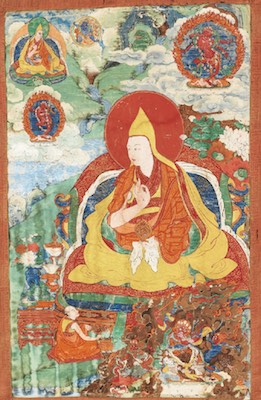Tsangyang Gyatso: Difference between revisions
(Removed link as web site no longer active.) |
mNo edit summary |
||
| Line 1: | Line 1: | ||
[[Image:TsangyangGyatso-1.jpg|frame|'''Tsangyang Gyatso - Sixth Dalai Lama''']]'''Tsangyang Gyatso''' (Tib. ཚངས་དབྱངས་རྒྱ་མཚོ་, Wyl. ''tshangs dbyangs rgya mtsho'') (1683-1706) — the Sixth Dalai Lama. He was born at Urgelling Monastery in the northwestern part of present day Arunachal Pradesh. The Regent Desi Sangye Gyatso kept the death of the [[Fifth Dalai Lama]] secret for many years, one reason being to complete the Potala palace and to keep the administration stable. | [[Image:TsangyangGyatso-1.jpg|frame|'''Tsangyang Gyatso - Sixth Dalai Lama''']]'''Tsangyang Gyatso''' (Tib. ཚངས་དབྱངས་རྒྱ་མཚོ་, [[Wyl.]] ''tshangs dbyangs rgya mtsho'') (1683-1706) — the Sixth Dalai Lama. He was born at Urgelling Monastery in the northwestern part of present day Arunachal Pradesh. The Regent Desi Sangye Gyatso kept the death of the [[Fifth Dalai Lama]] secret for many years, one reason being to complete the [[Potala]] palace and to keep the administration stable. As a Dalai Lama, Tsangyang Gyatso composed many songs and poems that gained popularity in Tibetan and China and also enjoyed a lifestyle that was at odds with the [[Gelug]] monastic system. He preferred to wear layman clothes and spent nights in the streets of [[Lhasa]], drinking wine, singing songs and having relationships with women. | ||
Tsangyang Gyatso was kidnapped by China's Kangi emperor Lha-Bzang Khan and mysteriously disappeared. He composed a poem that some say foretold his next rebirth as [[Kalzang Gyatso]]. | Tsangyang Gyatso was kidnapped by China's Kangi emperor Lha-Bzang Khan and mysteriously disappeared. He composed a poem that some say foretold his next rebirth as [[Kalzang Gyatso]]. | ||
Latest revision as of 09:46, 22 April 2018

Tsangyang Gyatso (Tib. ཚངས་དབྱངས་རྒྱ་མཚོ་, Wyl. tshangs dbyangs rgya mtsho) (1683-1706) — the Sixth Dalai Lama. He was born at Urgelling Monastery in the northwestern part of present day Arunachal Pradesh. The Regent Desi Sangye Gyatso kept the death of the Fifth Dalai Lama secret for many years, one reason being to complete the Potala palace and to keep the administration stable. As a Dalai Lama, Tsangyang Gyatso composed many songs and poems that gained popularity in Tibetan and China and also enjoyed a lifestyle that was at odds with the Gelug monastic system. He preferred to wear layman clothes and spent nights in the streets of Lhasa, drinking wine, singing songs and having relationships with women.
Tsangyang Gyatso was kidnapped by China's Kangi emperor Lha-Bzang Khan and mysteriously disappeared. He composed a poem that some say foretold his next rebirth as Kalzang Gyatso.
Further Reading
- Dargyé, Ngawang Lhundrup. The Hidden Life of the Sixth Dalai Lama (Studies in Modern Tibetan Culture), Lexington, 2011
- Dhondup, K. "Songs of the Sixth Dalai Lama", Library of Tibetan Works and Archives, 1981. Bilingual, Tibetan and English. [ISBN: 81-85102-11-2]
- Rick Fields, Brian Cutillo & Mayumi Oda, The Turquoise Bee: The Lovesongs of the Sixth Dalai Lama, Harpercollins, 1994.
- Thomas Laird, The History of Tibet—Conversations with the Dalai Lama (London: Atlantic Books, 2006), pages 181-195.
- Geoffrey Waters, White Crane: Love Songs of the Sixth Dalai Lama, White Pine Press, 2007
- Paul D. Williams, Songs of Love, Poems of Sadness: The Erotic Verse of the Sixth Dalai Lama, I.B. Taurus, 2005. [ISBN: 1 85043 479 4]
- Michael Aris, Hidden Treasures & Secret Lives: A Study of Pemalingpa (1450-1521) and The Sixth Dalai Lama (1683-1706), Routledge, 2016. [ISBN: 978-1138992191]